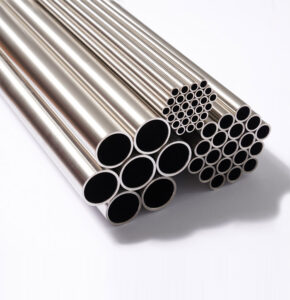Stainless Steel & Nickel alloy Tube & Pipe
Stainless steel and nickel alloy tubes are essential components used in various industries for conveying fluids, gases, and solids in a wide range of applications.
Stainless Steel Tubes:
The alloy known as stainless steel is created when steel is combined with other
Composition: Stainless steel tubes are primarily made from iron, chromium, nickel, and other alloying elements. The most common grades of stainless steel tubes include 304 (also known as 18-8 stainless steel), 316 (marine-grade stainless steel), 321, and 347, each offering specific properties suited for different applications.

Applications: Stainless steel tubes find extensive use in industries such as food and beverage processing, pharmaceuticals, petrochemicals, automotive, aerospace, and construction. They are used for conveying corrosive fluids, high-pressure gases, heat exchangers, structural components, and instrumentation.
Types: Stainless steel tubes come in various types, including seamless tubes and welded tubes. Seamless tubes are made from a solid billet, ensuring uniformity and strength, while welded tubes are fabricated from flat strips of stainless steel that are welded together along the length.
Characteristics: Stainless steel tubes offer excellent corrosion resistance, high strength, and durability, even in harsh environments. They are easy to clean and maintain, making them suitable for sanitary applications in industries such as food and pharmaceuticals.

Nickel Alloy Tubes
Composition: Nickel alloy tubes are made from nickel and other alloying elements such as chromium, molybdenum, and iron. Common nickel alloys used for tubes include Inconel (alloy 600, 625, 718), Monel (alloy 400), Hastelloy (alloy C-276, C-22), and Alloy 20.
Applications: Nickel alloy tubes are used in industries where corrosion resistance, high temperature strength, and exceptional performance under extreme conditions are required. They are commonly used in chemical processing, oil and gas exploration, aerospace, marine, and power generation industries.
Types: Nickel alloy tubes are available in both seamless and welded forms, similar to stainless steel tubes. Seamless nickel alloy tubes offer superior strength and resistance to cracking, while welded tubes are more economical and suitable for less demanding applications.
Characteristics: Nickel alloy tubes exhibit excellent corrosion resistance in corrosive environments, including acidic and alkaline solutions, as well as resistance to oxidation and high-temperature degradation. They offer high strength and toughness, making them suitable for critical applications in harsh operating conditions.


